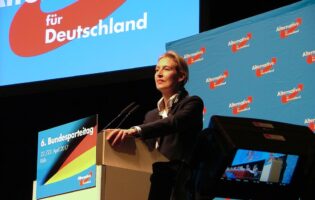European Integration and the EU’s Common Security and Defense Policy
Stephan Wallace
Defense and Security Policy Analyst
Stephan Wallace is a defense and security policy analyst following political, military, and economic developments in Europe. He has worked more than 33 years on this area for the U.S. government, most recently for the U.S. Department of Defense.
With the election behind her, Chancellor Merkel has been more outspoken in support of further European integration. In the new government’s declaration to the Bundestag on 29 January, she said Europe’s future requires further integration, including strengthening of European institutions, the creation of a genuine economic union, and a willingness for Europe to “bundle its forces” to meet the challenges ahead. [1] Following talks with Luxembourg’s Prime Minister Xavier Bettel on 6 February, Merkel called for moving ahead with banking union and for closer cooperation among euro zone members. She also said that in a world of seven billion persons, the Europeans will have to act together and speak with one voice if they are to play a role in shaping the future. [2]
Thorsten Benner, Director of the Global Public Policy Institute in Berlin, noted last December that Foreign Minister Steinmeier and Defense Minister von der Leyen “are very much in favor of greater EU integration,” in particular with regard to the EU’s Common Security and Defense Policy (CSDP). He added that Chancellery Chief of Staff Altmaier and Finance Minister Schäuble share similar aspirations and likely would support a “smart plan” for driving forward European security and defense integration. [3]
- During the NATO defense ministerial in Brussels 26-27 February, von der Leyen reiterated Germany’s support for the concept of “framework nations” in which larger allies with a broad spectrum of capabilities create force structures capable of integrating the niche capabilities of smaller allies in order to preserve capabilities that otherwise might be lost in times of tight budgets. [4]
Armed Forces chief General Wieker focused on German efforts to promote greater European defense integration in his address to the German Council on Foreign Relations (DGAP) 12 February. Wieker said the Bundeswehr wants to expand and further develop the concept of pooling and sharing and will support this process through its own structural reforms. The Bundeswehr will maintain a broad spectrum of capabilities—even at the expense of depth and sustainability—so that Germany can serve as a framework nation capable of integrating the contributions of smaller allies. Wieker noted that the process also requires building mutual trust among allies as well as strengthening the mechanisms of European institutions in order to build complementary capabilities, close capability gaps, and reduce redundancies. [5]
Germany has found willing partners for its European defense integration goals in the BENELUX countries and also increasingly in Poland. Dutch Defense Minister Jeanine Hennis-Plasschaert and Belgian Defense Minister Pieter de Crem have supported Germany’s framework nation concept and are pursuing a wide range of cooperative projects with Germany, with each other, and with other European partners.[6] Poland and Germany are exploring possibilities for enhanced naval cooperation; they continued their discussions on this initiative during Defense Minister von der Leyen’s visit to Warsaw 6 March. [7]
- Hennis-Plasschaert and former German Defense Minister de Mazière signed a declaration of intent on further enhancement of bilateral defense cooperation 28 May 2013, in which they agreed that “all possibilities for bilateral cooperation will be exploited, within all areas of concept and capability development, command and control, combat as well as combat support and combat service support.” An annex to the agreement identifies a long list of projects that includes integration of the Netherlands 11th Airmobile Brigade in the German Army’s Rapid Reaction Division (Division Schnelle Kräfte – DSK), development of a German-Netherlands fire support (artillery) unit, development of a sea-based missile defense capability, and intensified bilateral cooperation on ground-based air and missile defense. [8]
- De Mazière and his Polish counterpart Thomasz Siemoniak signed a declaration of intent on enhanced maritime cooperation 27 May 2013. Among the list of 28 opportunities for potential projects are cooperation in the field of submarines, common development/procurement and manning of Joint Support Ships and new tankers, and embarkation of helicopter detachments on each other’s ships. They also agreed to cooperate on maritime situational awareness in the Baltic Sea area.[9]
- Germany and its BENELUX partners also point to the European Air Transport Command (EATC), a multinational command exercising operational control and air tasking authority over the air transport fleets of Belgium, France, Germany, Luxembourg, and the Netherlands, as a prime example of the benefits of pooling and sharing military assets and capabilities.[10]
The results of a Eurobarometer poll published in February 2014 revealed strong public support for more concerted European action in foreign and security policy. According to the poll, 75 percent of Germans and 63 percent of all EU respondents are in favor of a common EU foreign policy, while 82 percent of Germans and 73 percent of all EU respondents would like a common defense and security policy. The poll, conducted in all 28 member states of the EU from 2 to 17 November 2013, also showed a preference for deepening rather than widening the European Union: 69 percent of Germans and 52 percent of all EU respondents rejected further enlargement. [11]
Turkey’s EU Aspirations. The CDU/CSU and SPD were unable to resolve their differences over Turkey’s bid for full membership in the European Union. The CDU/CSU remain opposed to, and the SPD continues to support, eventual Turkish membership. According to SPD foreign policy spokesman Dr. Rolf Mützenich, the CDU and CSU tried but failed to include language in the coalition agreement rejecting Turkey’s EU membership on the grounds that Turkey does not fulfill the conditions for membership. [12] The final text of the coalition agreement skirts the membership issue, describing Turkey’s negotiations with the EU as an open-ended process with no automaticity or guarantee of the outcome. It states that if the EU proves incapable of integrating Turkey or Turkey is unable to meet the obligations of membership, a way must be found to closely tie Turkey to EU structures, including strategic cooperation in foreign and security policy questions. [13] Former Ambassador Wolfgang Ischinger, Chairman of the Munich Security Conference, wrote in December that the coalition’s lack of unity on this issue will hinder Germany from playing a more proactive role internationally. [14]
- On the eve of Turkish Prime Minister Recep Tayyip Erdogan’s visit to Germany in early February, Foreign Minister Steinmeier called for the acceleration of Turkey’s EU membership negotiations following a meeting in Berlin with his Turkish counterpart Ahmet Davutoglu. Steinmeier said the door must remain open to Turkish membership, despite growing concerns within the EU about the Turkish government’s lack of respect for the rule of law and the independence of the Turkish judiciary. [15]
- Chancellor Merkel was much less supportive of Turkey’s membership aspirations during her meeting with Erdogan on 4 February. In response to Erdogan’s request for German support of Turkey’s membership bid, Merkel repeated the agreed coalition position that the negotiations are an open-ended process but said she remains skeptical about Turkey’s full membership in the EU. [16] Moreover, Germany’s Frankfurter Allgemeine Zeitung reported that the CDU’s draft program for elections to the European Parliament contains language expressly rejecting Turkish membership. [17]
Stephan Wallace is a defense and security policy analyst following political, military, and economic developments in Europe. He has worked more than 33 years on this area for the U.S. government, most recently for the U.S. Department of Defense. He can be contacted by email at wallace.stephan@gmail.com. The views expressed are those of the author alone. They do not necessarily reflect the views of the American-German Institute (AGI).
[1] Angela Merkel, “Regierungserklärung von Bundeskanzlerin Merkel,” Bundeskanzleramt/Bundeskanzlerin, 29 January 2014.
[2] Angela Merkel, “Statements von Bundeskanzlerin Merkel und dem luxemburgischen Premierminiser Bettel im Bundekanzleramt,” Bundeskanlzeramt/Bundeskanzlerin, 6 February 2014; “Merkel: Europa muss mit einer Stimme sprechen, Bundesregierung,” 6 February 2014.
[3] Thorsten Benner, “European defense policy needs new impetus,” Deutsche Welle, 19 December 2013.
[4] Ursula von der Leyen, “Ministerin im DLF-interview: NATO-Staaten müssen sich ‘miteinander modern aufstellen,’” Deutschlandfunk/Deutschlandradio, 27 February 2014.
[5] “Generalinspekteur: Sicherheitspolitik geht alle an,” BMVg, 13 February 2014; “Deutschland hat keinen Grund, sich zu verstecken,” DGAP, 12 February 2014.
[6] “Minister Hennis-Plasschaert eist politieke moed van bondgenoten,” Netherlands Ministry of Defense, 31 January 2014; J.A. Hennis-Plasschaert, Speech at the Munich Security Conference, 2 February 2013; “Kamerbrief over de internationale militaire samenwerking,” Netherlands Ministry of Defense BS2014002622, 13 February 2014; Pieter De Crem, Speech to the Atlantic Treaty Association, 10 December 2013.
[7] Florian Manthey, “Vetrauensvolle Kooperation: Ministerin von der Leyen besucht ihren polnischen Amtskollegen,” BMVg, 7 March 2014.
[8] Declaration of Intent between the Federal Minister of Defence of the Federal Republic of Germany and the Minister of Defence of the Kingdom of the Netherlands on the further Enhancement of Bilateral Relations in the Field of Defence, Netherlands Ministry of Defense, 28 May 2013.
[9] Declaration of Intent between the Federal Ministry of Defence of the Federal Republic of Germany and the Minister of National Defence of the Republic of Poland on Enhanced Maritime Cooperation, 27 May 2013; Thomas Wiegold, “Deutsche und Polen: Gemeinsam aufs Joint Support Ship,” Augen Geradeaus!, 28 May 2013; “Vertiefung der deutsch-polnischen Zusammenarbeit,” German Navy Press and Information Center, 27 May 2013.
[10] Norbert Thomas, “Multinationale Effektivität – EATC,” German Air Force, 22 February 2013; Nicholas Fiorenza, “Belgium Sees Savings in EATC,” Aviation Week, 11 March 2013.
[11] Eurobarometer: Deutsche verlangen koordinierteres Vorgehen der EU-Staaten, EU Commission Representation in Germany, 11 February 2014.
[12] Rolf Mützenich, “Außenpolitik mit sozialdemokratischer Handschrift!,” December 2013.
[13] Deutschlands Zukunft gestalten – Koalitionsvertrag zwischen CDU, CSU und SPD, 18. Legislaturperiode, 27 November 2013.
[14] Wolfgang Ischinger, “Deutsche Außenpolitik in der ‘Großen Koalition’: Nichts Neues?” Munich Security Conference – Monthly Mind, December 2013.
[15] “Steinmeier: Tür zur EU muss offen bleiben,” Frankfurter Allgemeine Zeitung, 3 February 2014.
[16] “Merkel zeigt Ergogan die kalte Schulter,” Frankfurter Allgemeine Zeitung, 4 February 2014;
[17] “Europa-Wahlprogramm CDU will EU-Vollmitgliedschaft der Türkei verhindern,” Frankfurter Allgemeine Zeitung, 3 February 2014.








